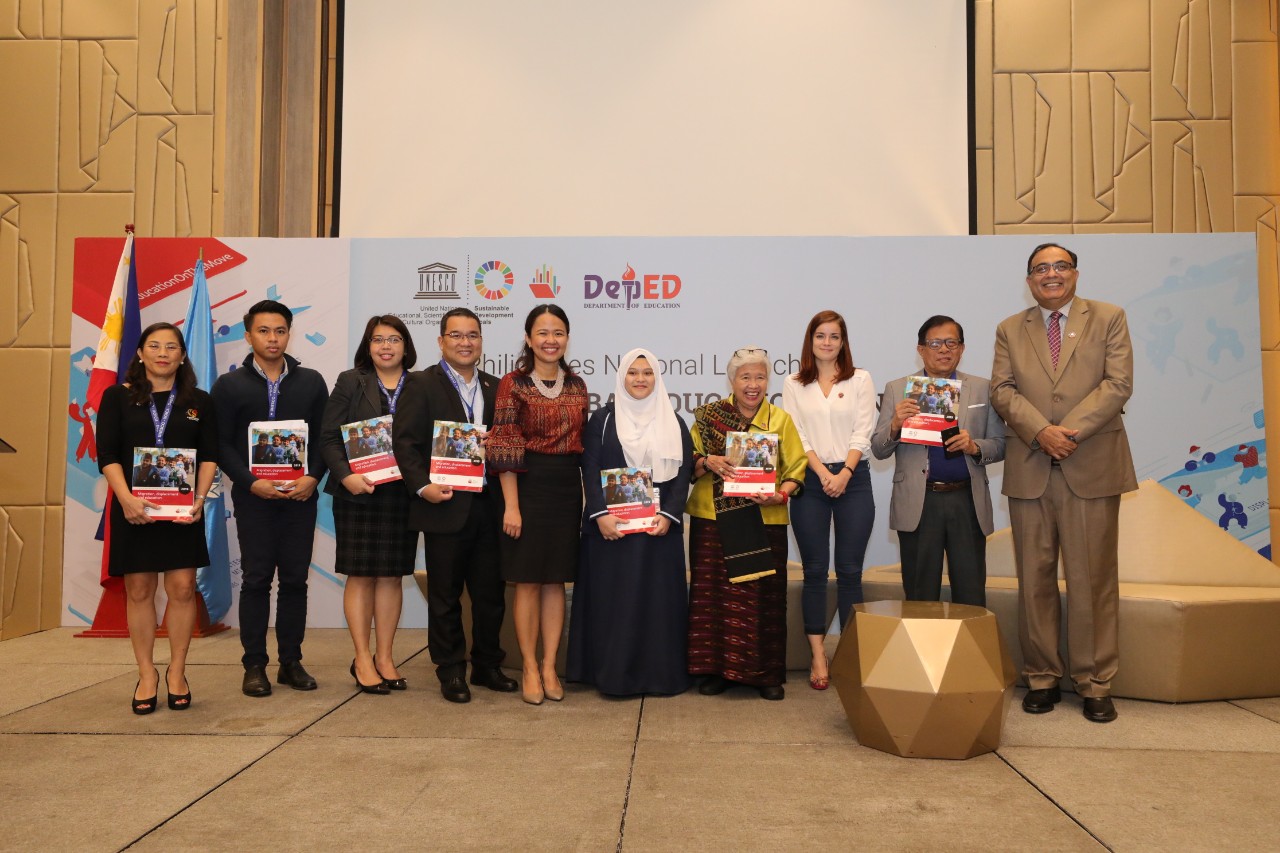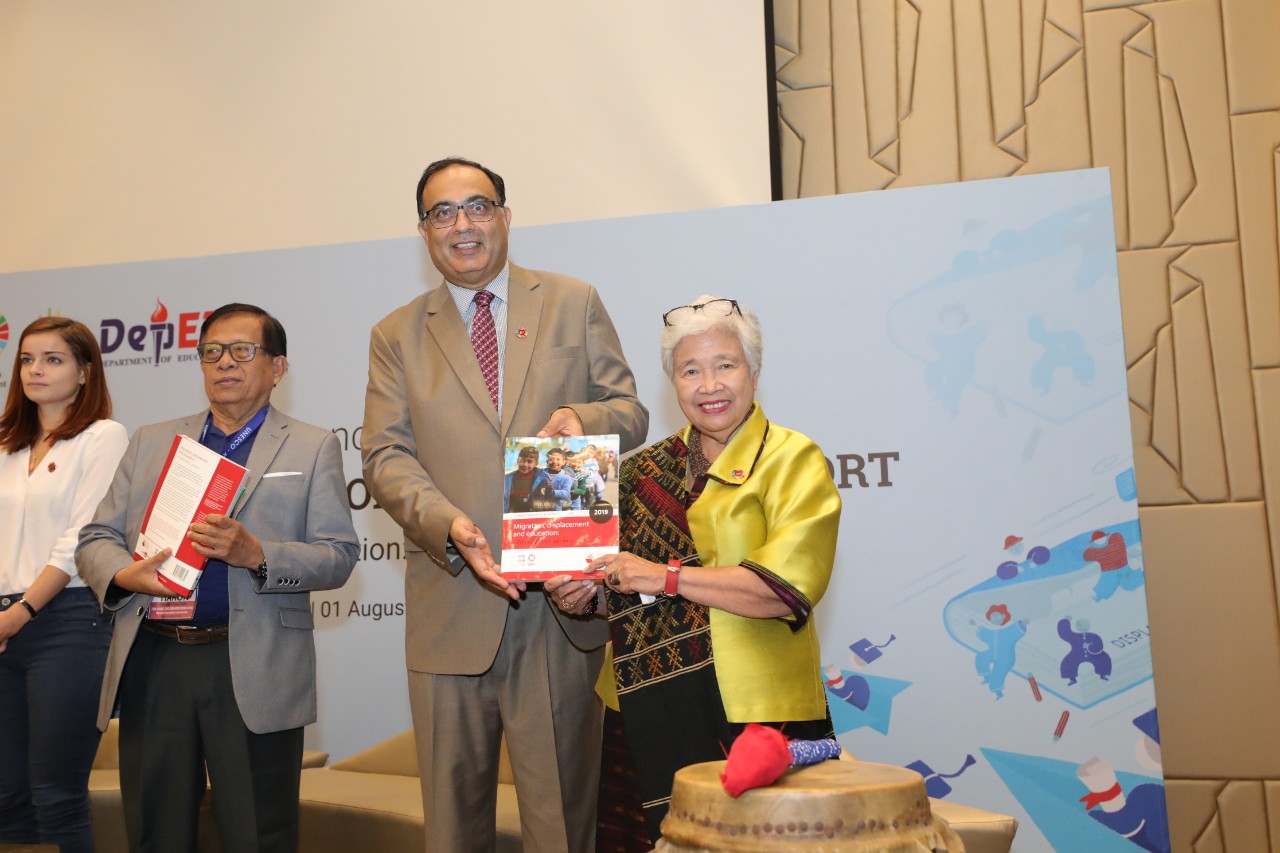TAGUIG CITY, August 1, 2019 – The United Nations Educational, Scientific, and Cultural Organization (UNESCO) Jakarta Office, the Department of Education (DepEd), and the UNESCO Global Education Monitoring (GEM) Report Team convened donors, education and humanitarian experts, policy-makers, teachers, and learners for the official launch of the 2019 GEM Report.
Held at Marquis Events Place in Taguig City, the launch was organized to increase awareness of the 2019 GEM Report’s messages and recommendations with the wider education community, with those working on humanitarian responses, and specifically with government officials and policymakers.
With the theme, “Migration, displacement and education: Building bridges, not walls,” the Report highlights the implications of different types of migration and displacement on education systems. It presents evidence on the gaps in educational opportunities and outcomes between immigrant and displaced learners and their peers in host communities. It likewise looks at the reverse influence of education on migration and displacement and how reforming curricula, textbooks, and teacher education can lead to addressing diversity and achieving inclusion.
Dr. Shahbaz Khan, Director and Representative of UNESCO Jakarta Office, stressed the importance of organizing high-level dialogue on policies proven by evidence to provide holistic quality education for migrants and those forcibly displaced.
“If we want to achieve real progress towards SDG 4, we need to continue the conversation and shed light to the various factors that prevent us from providing education to our children. From now on, protracted crises, short-term catastrophes, and migration should be taken into consideration not only in crafting policies for education but in forging new partnerships among organizations who want to give focus on the needs of our learners considered to be part of the poorest, most vulnerable, and those further behind,” Khan shared.
The Report estimates that in 2017, there were 258 million international migrants and over 87 million people displaced, either due to conflict, persecution, or natural disaster.
In the case of the Philippines, the Report shows that migration has affected the country positively. The country showed an increase in school attendance and reduced child labor due to the rise in international remittances from the migrant workers. Around 1.5 to three million children in the Philippines have parents living abroad and majority of them spend remittances they receive on education. On the other hand, conflicts in some parts of the country and natural disasters resulting in internal displacement continue to exacerbate people’s vulnerability as this deprives them access to quality education. The Alternative Learning System is one of the recognized solutions mentioned in the Report that can help children whose education was interrupted by displacement.
In delivering the keynote speech for the event, DepEd Secretary Leonor Magtolis Briones discussed how migration and displacement are linked to many issues and challenges—political, internal, and external, among many others. She likewise mentioned the case of the Marawi siege as an example of how the Department mandated schools all over the country to accept displaced learners even if they had no school documents with them.
“The experience of Marawi, I think, reflects and reminds us, especially Filipinos—again and again—that we are a loving and caring people,” the Secretary added. “I once said, and I say this with great courage, and perhaps impudence: we are not racists. We are not against other cultures. We are not against people of color because we are people of color ourselves.”
“It is good policy, it is great policy to take care of migrants and displaced persons, not only because they are fellow humans, but because they also make great contributions to our own culture,” Briones further emphasized.
Finally, she congratulated and thanked UNESCO for publishing the GEM Report: “We assure you that we will utilize this publication as it will also inform our policy.”
Aside from focusing on the issues of migration and displacement, the 2019 GEM Report also provided assessment of progress towards Sustainable Development Goal (SDG) 4 on education and its ten targets, as well as other related education targets in the SDG Agenda.
Also present in the said launch were DepEd Undersecretary Revsee Escobedo, Assistant Secretary G. H. Ambat, International Cooperation Office Director Margarita Ballesteros, Atty. Haron Meling of the Ministry of Basic, Higher, and Technical Education of the BARMM, and UNESCO Research Fellow for Social and Economic Research, Mr. Froilan Malit Jr.
END







